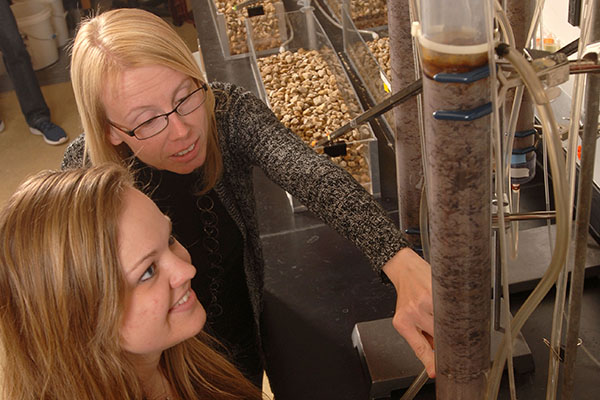As a Winona State undergraduate, Kristen Dieterman ’11 collected and analyzed water samples for the university’s Southeastern Minnesota Water Resources Center. Candace Kairies-Beatty, associate professor of Geoscience, has a background in understanding and solving drainage problems in coal mines.
It’s natural, then, that Dieterman and Kairies-Beatty would work together on developing an effective water treatment process for the Soudan Mine in the northeast corner of Minnesota.
Soudan, Minnesota’s oldest iron ore mine, tunnels more than half a mile underground. Soudan closed in 1962 – now it’s a state park – but the site continues to discharge water at the rate of 60 gallons per minute. Unacceptable levels of heavy metals, mainly copper and cobalt, contaminate the effluent at levels in excess of state water quality standards.
Dieterman, now a student in the Professional Science Master’s Degree program, is developing and testing prototype treatment systems under the direction of Kairies-Beatty. “She’s jumped into the project feet first,” says Kairies-Beatty of Dieterman.
Although they have run up against early technical glitches, the pair believe they can develop a model that can be scaled up to bring the massive daily discharge from Soudan to acceptable water quality levels.
“It will take more work, more intense work,” says Dieterman. That’s why she was drawn to the project: an opportunity to practice science to improve the environment targeted at “solving a real-world problem.”
Winona State’s Professional Science Master’s is an advanced degree program for professionals and recent graduates who wish to further their careers in science-related fields. Find out more at www.winona.edu/psm.


